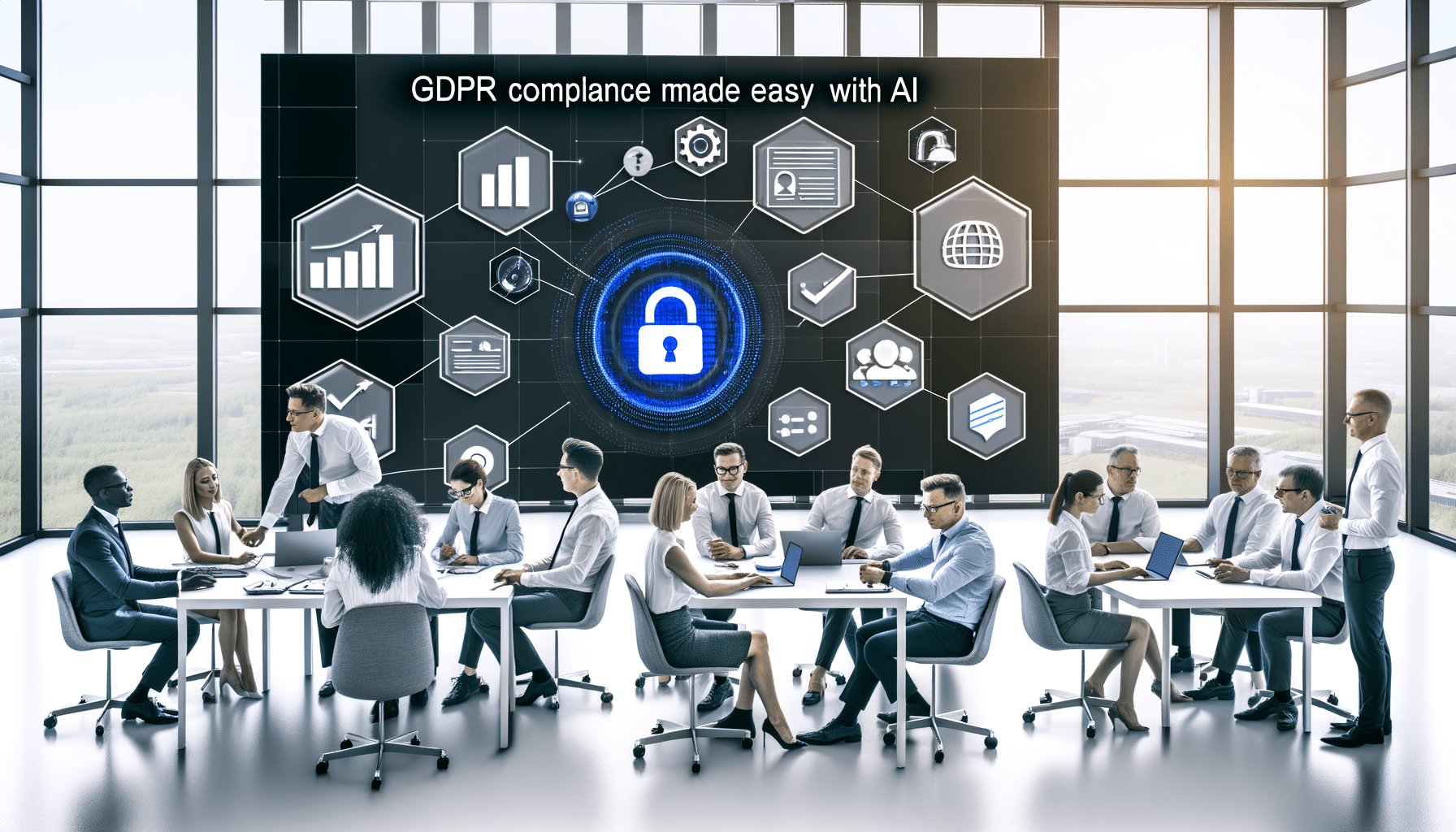- Blockchain Compliance
- November 16, 2024
GDPR Compliance Made Easy with AI

Demystifying GDPR Compliance: A Future-Ready Approach with AI
As companies continue to navigate the complex landscape of data protection, GDPR, or the General Data Protection Regulation, often looms large in discussions and strategies. Having spearheaded RecordsKeeper.AI, I’ve seen firsthand how leveraging cutting-edge technologies can transform daunting obligations into streamlined processes. Let me share some insights into how AI can make GDPR compliance a simple, efficient, and highly effective endeavor.
Understanding the GDPR Maze
Before diving in, let’s examine why GDPR compliance can feel so overwhelming. Enacted to protect the personal data of EU citizens, the regulation imposes extensive requirements on organizations. These obligations cover everything from how data is collected, processed, and stored, to obtaining explicit consent and offering robust data protection measures.
For compliance heads, legal, and finance professionals, these mandates translate to meticulous record-keeping, regular audits, and frequently updating data protection policies. The penalty for failing to comply isn’t just reputational damage; the fines can reach up to €20 million, or 4% of the global annual turnover—whichever is greater.
AI: Transforming Compliance into Simplicity
Enter Artificial Intelligence, a technology that’s not just buzzworthy but delivers tangible efficiency. At RecordsKeeper.AI, we harness AI not merely as a tool, but as a strategic partner in transforming how GDPR compliance is approached.
Automated Data Classification & Tagging: One of AI’s most impactful capabilities lies in automating the categorization of data. Using AI-driven algorithms, records are classified and tagged seamlessly, ensuring that sensitive data is accurately identified and handled according to GDPR standards. This enables organizations to navigate data landscapes without the usual associated manual drudgery.
Enhanced Data Monitoring and Alerts: AI’s predictive analytics can help in real-time monitoring of data activities. With enhanced security measures, AI systems can provide alerts on potential data breaches or irregularities in access patterns, enabling rapid response and minimization of risks.
The Role of AI in Regulatory Workflows
Incorporating AI into compliance management facilitates the automation of regulatory workflows. These AI systems can be tailored to meet specific GDPR requirements such as data subject access requests, consent management, and privacy assessments, ensuring that privacy procedures are consistently executed without human error.
Case in Point: A client using our platform was able to reduce their manual data processing workload by 60% within the first quarter. By freeing resources and automating compliance tasks, they could reallocate their efforts toward strategic growth initiatives.
Ensuring Data Integrity with Blockchain Technology
While AI ensures compliance efficiency, Blockchain enhances security—a critical aspect of GDPR. Utilizing Blockchain technology, RecordsKeeper.AI guarantees the immutability of data records, assuring that data integrity remains intact and compliant with the “data accuracy” principle of GDPR.
In practical terms, this means securing your records on a tamper-proof platform that aligns with GDPR’s stringent data protection standards. Imagine having an audit trail that is not only comprehensive but unalterable—this is the unparalleled advantage blockchain provides.
Streamlining Compliance Audits
Audits, typically a resource-intensive process, become manageable and even straightforward with AI-powered audit logs and reporting. These systems generate detailed, audit-ready reports, providing transparency and readiness that impress regulatory bodies and ensure compliance.
AI’s capability to continuously learn and update enhances the accuracy of these reports, minimizing human error and ensuring that audit management remains crisis-free.
Your Strategic Compliance Partner
As pressures mount from increasing regulations and data management challenges, it’s crucial for organizations to modernize their compliance strategies—embracing technological solutions that align with future needs.
By empowering organizations to reclaim control over their data, RecordsKeeper.AI offers a streamlined, AI-driven approach to GDPR compliance. The journey of achieving impeccable data management doesn’t have to be solitary; lean into technology designed to elevate and protect.
Conclusion: Charting Your Compliance Journey with AI
Navigating the GDPR landscape can indeed be complex, but it’s a challenge well-met when leveraging the transformative capabilities of AI. Whether it’s through automated data categorization, secure data rooms, or immutable blockchain record-keeping—technology is not just an aid; it’s a catalyst for redefining compliance strategies.
For those eager to explore how these benefits can be realized, and how AI can seamlessly integrate into your compliance framework, let’s continue this conversation. Follow me for more insights into AI-driven compliance innovations and strategic entrepreneurship lessons.
In the realm of data protection, remember: Technology is power. Use it to navigate, simplify, and succeed.
Toshendra Sharma is the visionary founder and CEO of RecordsKeeper.AI, spearheading the fusion of AI and blockchain to redefine enterprise record management. With a groundbreaking approach to solving complex business challenges, Toshendra combines deep expertise in blockchain and artificial intelligence with an acute understanding of enterprise compliance and security needs.
Related Posts

Organizing External Auditor Access
Setting up secure access for external auditors.
- December 22, 2024
Tracking Record Access During Audits
Maintaining clear logs of who accessed what during audits.
- November 22, 2024
Archives
- December 2024
- November 2024
- October 2024
- September 2024
- August 2024
- July 2024
- June 2024
- May 2024
- April 2024
- March 2024
- February 2024
- January 2024
- December 2023
- November 2023
- October 2023
- September 2023
- August 2023
- July 2023
- June 2023
- May 2023
- April 2023
- March 2023
- February 2023
- January 2023
- December 2022
- November 2022
- October 2022
- September 2022
- March 2019
Want to get more content like this?
Signup to directly get this type of content to your inbox!!
Latest Post
Organizing External Auditor Access
- December 22, 2024
Document Control in Manufacturing Plants
- December 21, 2024
Handling Rush Financial Report Requests
- December 20, 2024
Managing Record Access After Staff Changes
- December 19, 2024





